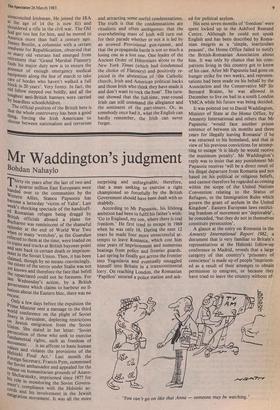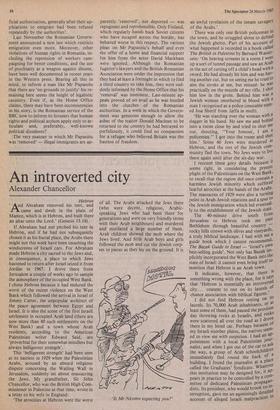Mr Waddington's judgment
Bohdan Nahaylo
Thirty-six years after the last of two and a quarter million East Europeans were handed over to the communists by the Western Allies, Stancu Papusoiu has become a latterday 'victim of Yalta'. Last Week's shocking spectacle of the handcuff- ed. Romanian refugee being draggd by British officials aboard a plane for Bucharest was reminiscent of the shameful episodes at the end of World War Two When so many 'wretches', as the Guardian referred to them at the time, were loaded on to trains and trucks at British bayonet-point and sent back to certain death or imprison- Ment in the Soviet Union. Then, it has been claimed, though by no means convincingly, the extent of the terror under Stalin was not Yet known and therefore the fate that befell the repatriated could not be foreseen. For last Wednesday's action, by a British government which claims to harbour no il-
lusions about the Eastern bloc, there was no excuse.
Only a few days before the expulsion the Prime Minister sent a message to the third World conference on the plight of Soviet JewrY in Jerusalem, deploring restrictions jo Jewish emigration from the Soviet moo. She stated in her letter: 'Soviet persecution of those who seek to exercise fundamental rights, such as freedom of Movement . is an affront to basic human values and violates the provisions of the Flielsinki Final Act.' Last month the t oreign Secretary, Francis Pym, summoned he Soviet ambassador and appealed for the t'elease on humanitarian grounds of Anato- !Y, Shcharansky, imprisoned since 1977 for nis role in monitoring the Soviet Govern- Merit's compliance with the Helsinki ac- cords and his involvement in the Jewish ernigration movement. It was all the more surprising and unforgivable, therefore, that a man seeking to exercise a right championed so forcefully by the British Government should have been dealt with so shabbily.
According to Mr Papusoiu, his lifelong ambition had been to fulfil his father's wish: `Go to England, my son, where there is real freedom.' He first tried to escape in 1969 when he was only 16. During the next 12 years he made four more unsuccessful at- tempts to leave Romania, which cost him nine years of imprisonment and numerous beatings from police and frontier guards. Last spring he finally got across the frontier into Yugoslavia and eventually smuggled himself into Britain in a transcontinental lorry. On reaching London, the Romanian 'Papillon' entered a police station and ask-
ed for political asylum.
His next seven months of 'freedom' were spent locked up in the Ashford Remand Centre. Although he could not speak English and has been described by Roma- nian emigres as a 'simple, inarticulate peasant', the Home Office failed to notify the British-Romanian Association about him. It was only by chance that his com- patriots living in this country got to know of his case. After Mr Papusoiu had gone on hunger strike for two weeks, and represen- tations had been made on his behalf by the Association and the Conservative MP Sir Bernard Braine, he was allowed in December to live on bail in a south London YMCA while his future was being decided.
It was pointed out to David Waddington, Minister of State at the Home Office, by Amnesty International and others that Mr Papusoiu 'would face another prison sentence of between six months and three years for illegally leaving Romania' if he was returned to his homeland, and that in view of his previous convictions for attemp- ting to escape 'it is likely he would receive the maximum penalty'. Mr Waddington's reply was to insist that any punishment Mr Papasoiu receives 'will be a direct result of his illegal departure from Romania and not based on his political or religious beliefs, and cannot therefore be regarded as coming within the scope of the United Nations Convention relating to the Status of Refugees, or the Immigration Rules which govern the grant of asylum in the United Kingdom'. Eastern European laws restrict- ing freedom of movement are 'deplorable', he conceded, 'but they do not in themselves constitute persecution'.
A glance at the entry on Romania in the Amnesty International Report 1982, a document that is very familiar to Britain's representatives at the Helsinki follow-up conference in Madrid, reveals that a large category of that country's 'prisoners of conscience' is made up of people 'imprison- ed as a result of their attempts to obtain permission to emigrate, or because they have tried to leave the country without of- 'You can't go on like that Anna — someone may be watching.' ficial authorisation, generally after their ap- plications to emigrate had been refused repeatedly by the authorities'.
Last November the Romanian Govern- ment announced a new law which restricts emigration even more. Moreover, other violations of human rights in Romania, in- cluding the repression of workers cam- paigning for better conditions, and the use of psychiatry as a weapon against dissent, have been well documented in recent years in the Western press, Bearing all this in mind, to inform a man like Mr Papasoiu that there are `no grounds to justify' his re- maining here seems the height of legalistic casuistry. Even if, as the Home Office claims, there may have been inconsistencies in his story, is the Romanian service of the BBC now to inform its listeners that human rights and political asylum apply only to ar- ticulate and, preferably, well-known political dissidents?
The very manner in which Mr Papasoiu was 'removed' — illegal immigrants are ap- parently 'removed', not deported — was repugnant and reprehensible. Only Finland, which regularly hands back Soviet citizens who have escaped across the border, has behaved worse in this respect. The various pleas on Mr Papasoiu's behalf and even the offer of a home and financial support for him from the actor David Markham were ignored. Although the Romanian fugitive's lawyers and the British-Romanian Association were under the impression that they had at least a fortnight in which to find a third country to take him, they were sud- denly informed by the Home Office that his 'removal' was imminent. Last-minute ap- peals proved of no avail as he was hustled into the clutches of the Romanian authorities. In a week in which the Govern- ment was generous enough to allow the ashes of the traitor Donald Maclean to be returned to the country he had betrayed so perfidiously, it could find no compassion for a refugee who believed Britain was the bastion of freedom.















































 Previous page
Previous page